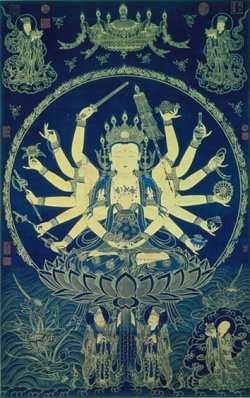Difference between revisions of "Cundī Bodhisattva"
Jump to navigation
Jump to search
| Line 1: | Line 1: | ||
[[File:Cundi Ming.JPG|thumb|250px|]] | [[File:Cundi Ming.JPG|thumb|250px|]] | ||
| − | [[Cundī Bodhisattva]] (准提菩薩). One of the six special [[forms]] of [[Avalokiteśvara]] [[Bodhisattva]] ([[Guanyin]] in {{Wiki|Chinese}}), who is forever active in delivering [[sentient beings]] that transmigrate through the six life-journeys. Hailed as mother of seven [[koṭi]] [[Buddhas]], [[Cundī]] is portrayed in {{Wiki|female}} [[form]] with three [[eyes]] and eighteen arms, adorned with a white [[conch shell]] on her wrist. In text 1076 (T20n1076), the [[Buddha]] states that [[cun]] means the [[unsurpassed enlightenment]]; [[di]] means that all [[phenomena]] are [[illusions]], irrelevant to [[being]] accepted or rejected; [[Cundī]] means the inherent [[purity]] of the nature of one’s true [[mind]]. | + | [[Cundī Bodhisattva]] ([[准提菩薩]]). One of the six special [[forms]] of [[Avalokiteśvara]] [[Bodhisattva]] ([[Guanyin]] in {{Wiki|Chinese}}), who is forever active in delivering [[sentient beings]] that transmigrate through the six life-journeys. Hailed as mother of seven [[koṭi]] [[Buddhas]], [[Cundī]] is portrayed in {{Wiki|female}} [[form]] with three [[eyes]] and eighteen arms, adorned with a white [[conch shell]] on her wrist. In text 1076 (T20n1076), the [[Buddha]] states that [[cun]] means the [[unsurpassed enlightenment]]; [[di]] means that all [[phenomena]] are [[illusions]], irrelevant to [[being]] accepted or rejected; [[Cundī]] means the inherent [[purity]] of the nature of one’s true [[mind]]. |
{{R}} | {{R}} | ||
Latest revision as of 05:04, 14 October 2013
Cundī Bodhisattva (准提菩薩). One of the six special forms of Avalokiteśvara Bodhisattva (Guanyin in Chinese), who is forever active in delivering sentient beings that transmigrate through the six life-journeys. Hailed as mother of seven koṭi Buddhas, Cundī is portrayed in female form with three eyes and eighteen arms, adorned with a white conch shell on her wrist. In text 1076 (T20n1076), the Buddha states that cun means the unsurpassed enlightenment; di means that all phenomena are illusions, irrelevant to being accepted or rejected; Cundī means the inherent purity of the nature of one’s true mind.
